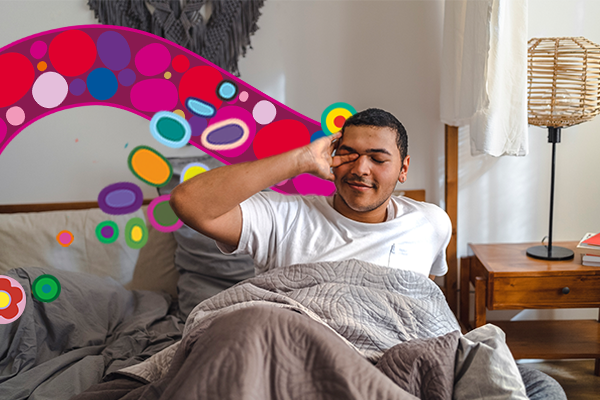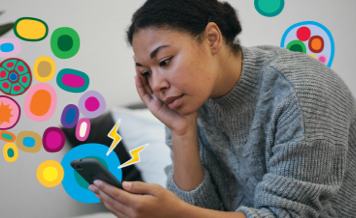Finding the right mental health professional for you

So, you’ve made the decision to get help with your mental health – well done. Asking for help is an important first step. And you’re not alone: over 2.7 million people in Australia – that’s 10 per cent of our population – received Medicare-subsidised, mental health-specific services in 2022–2023.
When you start to look at the options, it can be overwhelming: there are so many mental health services. Lots of questions pop up: do you need a psychiatrist, psychologist, counsellor, Mental Health social worker, or occupational therapist? What do each of them do? Which one is best suited to your needs? What are the costs? How much access is there and what are waiting periods like? How do you find a mental health professional, anyway?
The idea of sharing your thoughts and feelings with a stranger can also be intimidating. But it’s important to know that there’s a reason why they’re called “mental health professionals”. They have education, training, and skills in mental health, and are equipped to support you in a way that your friends and family can’t.
Here is a guide to getting the mental health help that’s right for you.
Mental health professionals
Psychiatrists
Psychiatrists are medical doctors who have completed additional specialist training to help people with emotional and mental health issues. Psychiatrists can diagnose and treat mental health issues and prescribe medication for mental health conditions. Some may also use talk-based therapies.
You need a referral from your GP to see a psychiatrist.
Psychologists and clinical psychologists
Psychologists (sometimes referred to as registered psychologists) are professionals who specialise in psychology – the study of human behaviour. To be registered to work in Australia, psychologists must have completed a 6-year university program that combines studies in basic psychology and professional psychology. Clinical psychologists specialise in mental health, and have completed an 8-year course of study.
Psychologists use different types of therapy to help people manage a range of psychological issues.
Psychologists can’t prescribe medication.
You don’t need a referral to see a psychologist. However, if you’d like to claim your treatment on Medicare, you will need a Mental Health Care Plan from your GP.
Psychiatrist vs psychologist
Still wondering about the difference between a psychologist and a psychiatrist? Let’s compare them side by side.
Both psychologists and psychiatrists have studied human behaviour and thinking, and how the brain works, and they both use therapies to help people with their mental health issues. But there are important differences between them, and which one of them you might need to see will depend on your individual circumstances.
Basically:
A psychiatrist is a medical doctor who has also received training to diagnose and treat people with mental disorders, such as neurological imbalances. Psychiatrists can prescribe medication and other treatment for these.
A psychologist has received training to diagnose and treat people with psychological challenges and conditions, such as emotional problems. Psychologists don’t have medical degrees and can’t prescribe medication.
Your GP is the best person to talk to about which one of these professionals you may need to see, but generally speaking:
A psychologist is appropriate if
- you’re living with anxiety, depression, stress, or other mental health issues
- you need support to cope with everyday life
- you need a mental health assessment.
A psychiatrist is appropriate if
- your doctor refers you
- you have a severe condition, like a mental disorder, that has lasted a long time or keeps recurring
- other treatment isn’t working
- you are thinking of self-harm or suicide.
Counsellors
Counsellors are mental health professionals who help people work through their personal issues by asking questions and listening in way that is non-judgemental, safe, and confidential. This way, people can recognise and define their emotional, health, mental and lifestyle problems, and understand themselves and their behaviour better. Treatment is usually short-term.
While a counsellor may have a degree, such as a Bachelor or Master of counselling, not all counsellors are required to have specific counselling education. All practising counsellors in Australia are, however, required to have completed appropriate study and training, and there are professional bodies – like the Psychotherapy and Counselling Federation of Australia and the Australian Counselling Association – to make sure that counsellors have the right skills to help with mental health issues.
Counsellors can’t prescribe medication.
You don’t need a referral to see a counsellor, and you can’t claim your counsellor treatment on Medicare.
Mental Health social workers
A Mental Health social worker is a qualified social worker who has completed advanced training and education in mental health, and is accredited by the Australian Association of Social Workers as someone who is able to provide mental health services and support.
Mental Health social workers help people with their mental health issues in a holistic way, by offering counselling and therapy as well as by addressing external factors – like social issues – that also affect their mental wellbeing.
Mental Health social workers can’t prescribe medication.
You don’t need a referral to see a Mental Health social worker. However, if you’d like to claim your treatment on Medicare, you will need a Mental Health Care Plan from your GP.
Occupational therapist
A mental health occupational therapist is a professional occupational therapist who has additional knowledge, skills, and experience in mental health, and has the Occupational Therapy Australia Mental Health Endorsement.
Mental health occupational therapists work with people to help them better participate in everyday life, work, and home.
Mental health occupational therapists can’t prescribe medication.
You don’t need a referral to see a mental health occupational therapist. However, if you’d like to claim your treatment on Medicare, you will need a Mental Health Care Plan from your GP.
Getting the right support for your mental health
There are different approaches but a good place to start is by talking to your GP. You can talk to your GP about a Mental Health Care Plan (MHCP), and they’ll be able to identify the most appropriate mental health specialist for your particular mental health issue. They’ll also have knowledge of the mental health professionals in the local area.
Location can be important. It’s a good idea to make sure that your mental health professional is in an accessible location not too far away so that getting there isn’t more challenging than it needs to be.
How to find a psychologist, counsellor, or other mental health professional near you
Other than talking to your GP, another way to look for a specialist in mental health is with the search tools provided by some key mental health professional organisations:
- The Australian Psychological Society – Find a psychologist tool
- The Australian Counselling Association – Find a counsellor tool
- The Psychotherapy and Counselling Federation of Australia – Find a therapist tool
If there isn’t an appropriate mental health professional in your area, or you simply can’t get to one, remember that many mental health professionals offer telehealth services. Look for telehealth options when doing your research.
Medibank health insurance members can chat to a mental health professional about how they feel and ask questions about a range of mental health concerns for themselves or a loved one and get guidance on what they can do next. Chat online or call 1800 644 325 anytime of the day or night, 7 days a week at no extra cost.*

24/7 Medibank Mental Health Support
Medibank health insurance members can chat to a mental health professional about how they feel and ask questions about a range of mental health concerns for themselves or a loved one and get guidance on what they can do next. Chat online or call 1800 644 325 anytime of the day or night, 7 days a week at no extra cost.~
How much will seeing a mental health professional cost?
Before you choose a mental health professional, you may want to have an idea of what it’s going to cost. Costs will vary according to the type of mental health practice and individual practitioner, so always remember to ask your chosen mental health professional what they charge, and if you’ll be able to claim rebates for their services.
First, you may want to talk to your GP about a Mental Health Care Plan (MHCP). An MHCP allows you to access Medicare rebates for up to 10 individual sessions with a mental health professional each calendar year. You can claim rebates on consultations with psychiatrists, psychologists (both clinical and registered), eligible social workers, and eligible occupational therapists through Medicare.
If you don’t wish to get a referral to see a psychologist, or you’ve already used up the sessions subsidised by Medicare under your MHCP, you may want to use your private health insurance instead. For Medibank covers, you must see a registered psychologist, Medibank recognised counsellor, or Mental Health social worker.# You can read more about using your cover for Mental Health Support here.
You can’t claim a Medicare rebate and claim on your health insurance for the same session.
Read more: Understanding the costs of mental health treatment
Questions to ask before you see a mental health professional
Before you book an appointment with a mental health professional, you may want to ask a few basic questions to learn more about their experience and style.
- Are they experienced in the specific area you need, or have an interest in it? It’s worth checking whether the practitioner you’re researching suits your needs. If you’re not sure, ask.
- What are their qualifications? Make sure that their qualifications are both legitimate and appropriate to your mental health issue and personal needs.
- Are their professional registrations up to date? Most types of health professionals must be registered with the Australian Health Practitioner Registration Agency. You may also want to check whether they’re registered with a more specific organisation – for example if a counsellor is also registered with the Australian Counselling Association.
- Are they female, male, nonbinary? Being comfortable is important, and the professional’s gender may be one of those things that contribute to your level of comfort.
- How much will treatment cost? It’s important to understand this from the outset, to avoid any unpleasant surprises, and so that you can plan for the expense.
- How many sessions will you need, and how often? While you may not get a definitive answer, an estimate should at least set up your expectations and help you fit appointments around your life.
- Do you need a referral? Remember that some mental health professionals, like psychiatrists, require a referring doctor or specialist. Others may not need a referral but may need an MHCP if you’re going to claim the treatment on Medicare.
- Can they offer appointments at days and times that are convenient for you? Along with making sure their location is convenient, you’ll want to make sure that appointment days and times work for you, too.
If you start seeing a mental health professional and it doesn’t work out, don’t let it discourage you. Although it can be challenging when you’re going through a rough patch, it’s worth it to keep trying until you find the right person for you.
Remember, you are always in control when it comes to prioritising your mental health. Ask lots of questions, do a bit of research and assess how a psychologist or other mental health professional factors into your life. You can read more about what to expect when you see a psychologist here.
Where to get help
If your life or someone else’s is in danger, call 000 immediately.
If you’re in distress and need help, call Lifeline on 13 11 14 for 24/7 crisis support.
For non-emergency support, your GP or regular health practitioner is often the best place to start. They will be able to assess your individual situation and recommend the best next steps for your recovery.
Medibank health insurance members can chat to a mental health professional about how they feel and ask questions about a range of mental health concerns for themselves or a loved one and get guidance on what they can do next. Chat online or call 1800 644 325 anytime of the day or night, 7 days a week at no extra cost~.
Remember that help is always available, no matter the situation.
How can we help?
I want to know how my cover supports mental health
I need help and want to talk
Related articles
Things you need to know
~ Some referred services may involve out of pocket costs and waiting periods may apply.
While we hope you find this information helpful, please note that it is general in nature. It is not health advice, and is not tailored to meet your individual health needs. You should always consult a trusted health professional before making decisions about your health care. While we have prepared the information carefully, we can’t guarantee that it is accurate, complete or up-to-date. And while we may mention goods or services provided by others, we aren’t specifically endorsing them and can’t accept responsibility for them. For these reasons we are unable to accept responsibility for any loss that may be sustained from acting on this information (subject to applicable consumer guarantees).











































